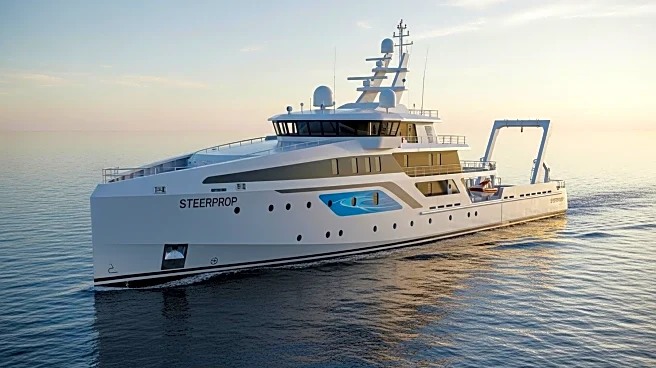What is the story about?
What's Happening?
Steerprop has been selected to provide its Contra-Rotating Propeller (CRP) azimuth propulsion systems for a new research vessel being constructed for the German Aerospace Center (DLR). The vessel, measuring 48 x 11 meters, will function as a floating laboratory for maritime research, primarily conducting voyages in the North Sea and Baltic Sea. It is designed to accommodate up to 20 individuals onboard for research trips lasting from one to several days. Steerprop's supply includes two CRP LM units, each rated at 750 kW and built to Ice Class 1A standards. The new CRP design features pressure lubrication, which reduces mechanical losses and enhances mechanical efficiency to 98.5%, compared to the typical 95%, thereby improving fuel economy and performance.
Why It's Important?
The integration of Steerprop's advanced propulsion technology into the German Aerospace Center's research vessel signifies a substantial advancement in maritime research capabilities. The enhanced efficiency and fuel economy provided by the CRP azimuth propulsion systems are crucial for reducing operational costs and environmental impact. This development is particularly significant for the maritime industry, as it aligns with global efforts to improve energy efficiency and sustainability in marine operations. The vessel's ability to conduct extended research voyages with reduced fuel consumption and emissions could lead to more comprehensive studies of marine environments, benefiting scientific research and environmental conservation efforts.
What's Next?
The deployment of the new research vessel equipped with Steerprop's propulsion systems is expected to commence soon, with research activities planned in the North Sea and Baltic Sea. The vessel's operations will likely contribute valuable data to maritime research, potentially influencing future designs of research vessels and propulsion systems. Stakeholders in the maritime industry, including shipbuilders and environmental organizations, may closely monitor the vessel's performance to assess the viability of adopting similar technologies in other applications. The success of this project could encourage further investments in sustainable maritime technologies.
Beyond the Headlines
The adoption of Steerprop's propulsion technology in the German Aerospace Center's research vessel highlights the growing trend towards sustainable innovation in the maritime sector. This move reflects a broader shift in industry priorities, emphasizing the importance of reducing environmental impact while maintaining operational efficiency. The pressure lubrication system introduced in the CRP design not only enhances mechanical efficiency but also sets a precedent for future developments in marine propulsion technology. As environmental regulations become increasingly stringent, such innovations are likely to play a critical role in shaping the future of maritime operations.
















